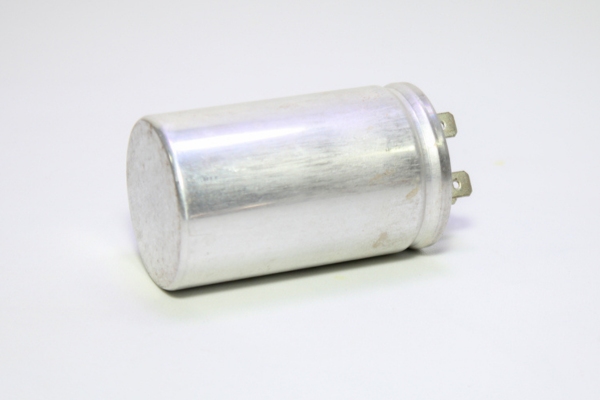
Capacitors are vital to the smooth operation of your air conditioning system. Though small in stature, these electrical elements are pivotal in boosting your air conditioner unit’s efficiency. For homeowners and HVAC fans, it’s crucial to grasp the role and significance of AC capacitors in maintaining optimal air conditioning performance.
This article from PFO Heating & Air Conditioner highlights the function, significance, and variety of air conditioner capacitors. It identifies common capacitor problems and their impact on cooling efficiency. By deepening your understanding of capacitors, you’ll be better prepared to pinpoint and resolve issues that could affect the effectiveness and durability of your home’s air conditioning system.
The Function of Air Conditioner Capacitors
Contents

An AC capacitor is ingeniously structured and features two metal plates divided by an insulator. Air conditioning systems typically see these components as sizable, cylindrical entities resembling batteries, distinguished by two or three posts emerging from their tops.
Capacitors are essential in energizing the motors within your air conditioning system and for delivering effective cooling to your home. Despite their importance, capacitors are frequently replaced due to their propensity to degrade or cease functioning.
If the AC capacitor fails, it can halt the entire functionality of your HVAC system. Your air conditioner might find it challenging to distribute cool air, which can put additional stress on the unit and possibly lead to increased energy expenses. Recognizing the importance of the AC capacitor is key to swiftly resolving such issues, promoting efficient cooling, and averting undue costs.
Maximize your air conditioner’s efficiency with our comprehensive maintenance services at PFO Heating & Air Conditioning. Call us today!
Why Is an Air Conditioner Capacitor Crucial?

The main role of an AC capacitor is to accumulate and discharge electrical energy, which powers the motors essential for the AC unit’s operation. Upon activating the cooling system, the capacitor delivers a surge of electricity that kick-starts the motors. This enables them to drive the compressor and fan, which is vital for initiating the system. Acting as a momentary power reserve, the capacitor furnishes the essential energy required for the air conditioner’s initial motor activation.
The AC capacitor is indispensable because the motors may not start or experience difficulty starting without it. A malfunctioning or faulty capacitor can manifest as the air conditioning unit failing to activate, reduced airflow, or the compressor cycling on and off repeatedly. In some cases, a defective capacitor might cause the entire air conditioning system to shut down.
Therefore, maintaining the capacitor in good working condition is crucial for the performance and efficiency of the air conditioner. Regular HVAC upkeep and timely replacement of capacitors, as needed, are essential practices to prevent breakdowns and ensure consistent cooling performance.
Reasons Why AC Capacitors Fail or Malfunction
AC capacitors may fail or malfunction for several reasons. Key factors include:
- AC Unit Age & Wear: As capacitors age, they naturally deteriorate and weaken, diminishing their ability to store a charge. The degradation of their internal components over time can result in decreased capacitance, ultimately leading to their failure.
- Overheating: While capacitors are designed to withstand normal operating temperatures, excessive heat can hasten their deterioration. High temperatures can hasten the breakdown of the capacitor’s internal components and insulation, contributing to early failure.
- Voltage Fluctuations: Rapid voltage changes or power surges can adversely affect AC capacitors. Electrical spikes, lightning strikes, or disruptions from power outages can strain capacitors beyond their design specifications, causing premature failure.
- Manufacturing Defects: Occasionally, capacitors suffer from manufacturing flaws, predisposing them to early breakdowns. These issues can stem from the use of substandard materials, errors in assembly, or insufficient testing procedures during production.
- Excessive Electrical Load: Subjecting the air conditioning system to heavy electrical loads, like prolonged operation or functioning under extreme weather conditions, can overburden the capacitors, increasing the likelihood of failure.
- Environmental Factors: Capacitors are also vulnerable to harsh environmental conditions. Exposure to moisture, humidity, dust, or corrosive chemicals can degrade their performance and shorten their service life. Such conditions can lead to corrosion, insulation damage, or short circuits within the capacitor.
Regular air conditioner maintenance, which should include inspecting and testing capacitors, is crucial in detecting potential problems before they escalate into complete failures. If a capacitor exhibits signs of bulging, leaking, or emitting a burnt odor, it indicates a malfunction. Replacing such capacitors promptly is essential to prevent further damage to the AC system.
Signs of a Failing Air Conditioning Capacitor
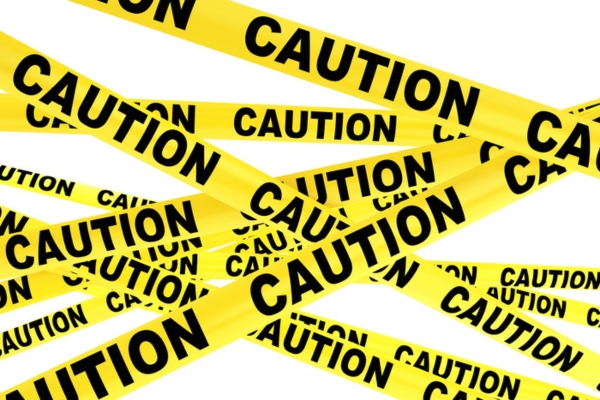
Be alert to these indicators of malfunctioning AC capacitors:
- Weak or No Cold Air: When your air conditioner emits warm or only mildly cool air instead of the expected cold blast, it may indicate a faulty capacitor. Since the capacitor is vital for powering the motors that facilitate cooling, its malfunction can lead to inadequate cooling performance.
- Air Conditioner Has Difficulty Starting: If your air conditioner hesitates or labors to start, taking longer to kick in or making multiple attempts without success, this could indicate a failing capacitor. Such start-up issues are a common symptom of capacitor problems.
- Frequent AC Unit Cycling: When a capacitor is nearing failure, the air conditioner might turn on and off more often than normal. This frequent cycling can stress the system excessively, accelerating wear and tear.
- Cooling System Buzzing or Humming Sounds: If you hear unusual noises like buzzing or humming from your air conditioner, it could be a sign of a capacitor issue. Faulty capacitors may create electrical disturbances, which manifest as these odd sounds.
- Capacitor Bulging or Leaking: Look for physical signs such as the bulging or swelling of the capacitor’s cylindrical body. In more severe cases, capacitors may leak oil or exhibit signs of charring or burning. These indicate damage and suggest that the capacitor needs immediate replacement.
- Tripped Breaker: A failing capacitor can draw excessive electrical currents, causing your circuit breaker to trip. If your air conditioner frequently trips the breaker, the capacitor should be checked as a likely cause.
Keep your air conditioner running smoothly with regular maintenance from the certified technicians at PFO Heating & Air Conditioning. Contact us today!
Call a Professional HVAC Contractor – Avoid DIY Repairs on Air Conditioner
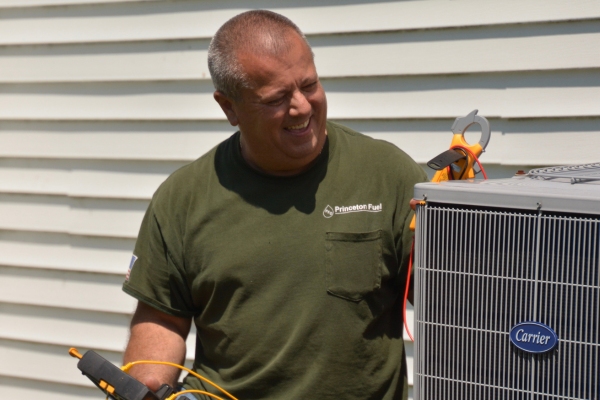
Capacitors It’s essential to enlist a professional HVAC technician when facing issues with your AC capacitor, primarily for safety reasons:
Safety Concerns
Dealing with electrical components is risky without the right expertise and experience. Capacitors can retain electrical charge even when the power is off, and improper handling can result in electrical shocks or other injuries. HVAC professionals are equipped with the necessary training to manage these risks safely.
Accurate Air Conditioner Diagnosis
When your AC malfunctions, a faulty capacitor might seem like the obvious issue, but other underlying problems could also exist. HVAC technicians possess the specialized skills required to diagnose the root cause of the problem accurately. They can determine whether the capacitor is at fault or if additional issues impact the system’s performance.
Correct Air Conditioner Capacitor Replacement
Capacitors vary in size, voltage ratings, and capacitance values, and choosing the incorrect type can exacerbate problems or cause your AC system to act up. HVAC professionals have the expertise to select the right capacitor for your system and perform a precise installation, which is crucial to prevent additional issues.
HVAC Warranty Considerations
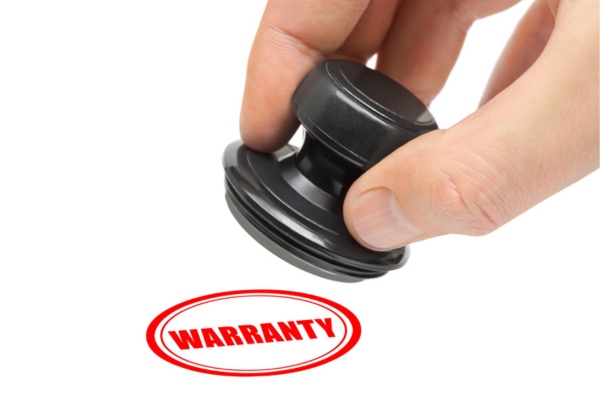
If your AC unit is covered, handling repairs or replacements on your own can risk voiding the warranty. Professional HVAC technicians carry the required certifications and are familiar with the stipulations of warranty agreements, ensuring that their repairs maintain coverage.
Don’t let a faulty AC ruin your summer. Call PFO Heating & Air Conditioning for expert repairs today!
Air Conditioner Efficiency & Performance
Air conditioning systems are intricate assemblies with multiple components that must work harmoniously to deliver optimal cooling. A professional technician does more than replace a capacitor; they evaluate the system to ensure every part functions correctly. This thorough approach helps enhance the system’s efficiency, cooling capacity, and overall performance.
Conclusion
Enlisting a professional HVAC technician to repair or replace your AC capacitor guarantees that the work is performed safely, precisely, and with a comprehensive approach to the entire system. This ensures that your investment is protected, warranty conditions are upheld, and your air conditioning system operates efficiently and reliably.
Call PFO Heating & Air Conditioning for Superior HVAC Services
PFO Heating & Air Conditioning delivers exceptional heating and cooling services throughout the Greater Princeton, NJ area. We employ the finest professionally certified technicians adept at providing top-notch HVAC tune-ups, repairs, installations, and replacements. Each technician brings extensive knowledge and experience, ensuring your HVAC system gets proper service.
We pride ourselves on offering the region’s most competitive heating and cooling service rates. Our maintenance services are designed to boost comfort and energy efficiency and lower heating and cooling expenses. Should you require an HVAC repair or a new system, we can guide you to the best solution for your needs and budget. We stand behind our work with a comprehensive satisfaction guarantee. To schedule a free in-home estimate and service appointment, call PFO Heating & Air Conditioning today.
Click here to contact us now or call us at (800) 253-9001 to find out more! Click the link to view our service area.
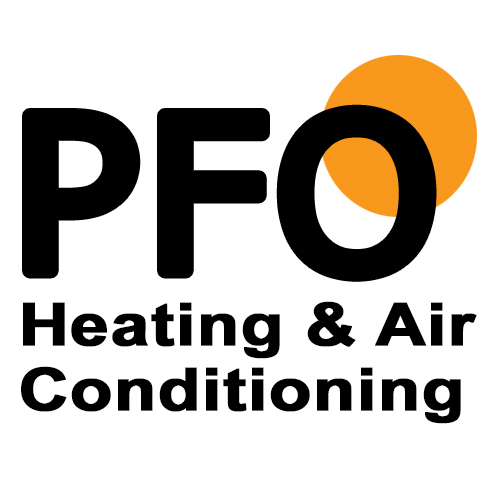
Related Articles:



